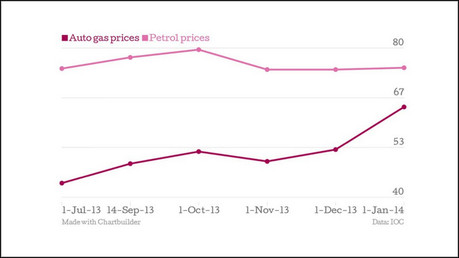
With 205 million internet users and more than one billion mobile phones, India is fast emerging as a global leader in digital technology.
Such growth has been noticed at Quartz, the business news site that launched in September 2012 and reached more than five million readers in January, and which last week announced it would be launching an Indian edition in June.
"This is an experiment but it's also driven by the fact that, since our launch, Indian readers have steadily grown," S. Mitra Kalita, ideas editor at Quartz, told Journalism.co.uk.
The number of Indian readers now regularly places at second or third in the global rankings, said Kalita, but the decision to open offices on the subcontinent, planned for Mumbai and Delhi, goes beyond simple traffic chasing.
Quartz "obsessions", like the mobile web, are increasingly relevant to the growing Indian market, she said, and the "4G revolution" will be an important topic as it goes live around the same time as Quartz India.India gives us a microcosm of some of the issues that the broader global economy is facingS. Mitra Kalita, Quartz
"My cousins in India had a mobile phone before I did," said Kalita, born in New York to parents from a "very rural area" of India, "and I think that does tell you something about this generation's comfort level with mobile.
"As we get into the next generation of technology – as far as wearable technology, the quantifiable self and the app for everything – there's that narrative insofar as a lot of our readers will be at that digitally-savvy place. On the other hand you also have an aspirational economy, first-generation tech users and college goers."
Quartz's continued coverage of topics like online learning and "the MOOCs [massive online open courses] initiative" is reflective of this aspirational economy, she said. And while Quartz hopes to serve readers all along the socio-economic spectrum, the "skills gap" in India is a major concern for both employers and the unemployed.
"India gives us a microcosm of some of the issues that the broader global economy is facing," she said, "and it gives us a platform to experiment, both journalistically, technologically and with a market that I think, in the space of digital-first, is really under-served."
A recent story that played on these themes told the tale of Bangalore rickshaw drivers whose fuel costs were rising as a result of the recent polar vortex phenomenon in the US.
As US demand for domestic heating rose in response to the plummeting temperatures, as did the price of propane, forcing drivers to pay 20 per cent more for their propane-based fuel.

Screenshot from Qz.com, showing the rise in fuel prices as a result of the polar vortex
"I expect we're going to be doing a lot more of those pieces that are of interest," Kalita said, "not just to somebody in Bangalore. It really does resonate globally so we're going to be looking for more opportunistic examples like that."
In another example, Quartz picked up a story by Scroll, an Indian mobile-first site launched in January and Quartz's editorial partner for the new edition, about a Mumbai entrepreneur who invented the world's best pizza delivery box.
Although it may seem like a throw-away topic, Kalita said, it also has global resonance.
"I expect we'll be doing more of those pieces," she said, "Quartz's signature content that's at the intersection of important and interesting.
"As a digital-first and mobile-first product, our readers tend to be digitally-savvy and really interested in gadgets and coverage of this growing area, so I think maybe we'll be seeing more coverage of the start-up scene in India."
And when these start-ups are based locally in India but have global relevance, it fulfils what Quartz is trying to achieve as it expands.
"India represents this great story as an emerging market" said Kalita, "and there's lots of questions about emerging markets. As far as media strategy it makes sense as a place to enter for our business audience – it's largely English speaking, they can probably school us and the rest of the world on the ways of the global economy, it's incredibly familiar with the notion of diaspora and being here nor there, everywhere but nowhere.
"There's something about India that is such a metaphor for the global economy."
Free daily newsletter
If you like our news and feature articles, you can sign up to receive our free daily (Mon-Fri) email newsletter (mobile friendly).
Related articles
- What AI can do for your newsroom: tips from Ring Publishing's latest handbook
- 200 speakers you need at your next journalism event to avoid all-male panels
- How young leaders can shape the future of the media industry
- Tools, tactics, and success stories of newsroom innovation in 2023
- How news brands can win over young audiences, with Danuta Breguła









